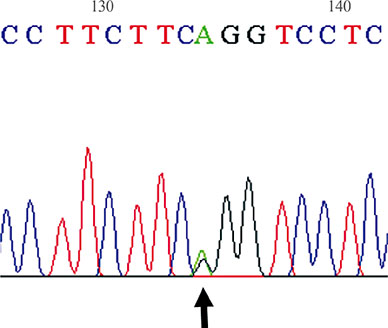Endocrinol Metab.
2017 Jun;32(2):296-301. 10.3803/EnM.2017.32.2.296.
Identification of Maturity-Onset Diabetes of the Young Caused by Glucokinase Mutations Detected Using Whole-Exome Sequencing
- Affiliations
-
- 1Division of Endocrinology and Metabolism, Department of Internal Medicine, Kangwon National University School of Medicine, Chuncheon, Korea. sangwookkim@kangwon.ac.kr
- 2Department of Medical Biotechnology, Institute of Bioscience and Biotechnology, Kangwon National University College of Biomedical Science, Chuncheon, Korea.
- KMID: 2384090
- DOI: http://doi.org/10.3803/EnM.2017.32.2.296
Abstract
- Glucokinase maturity-onset diabetes of the young (GCK-MODY) represents a distinct subgroup of MODY that does not require hyperglycemia-lowering treatment and has very few diabetes-related complications. Three patients from two families who presented with clinical signs of GCK-MODY were evaluated. Whole-exome sequencing was performed and the effects of the identified mutations were assessed using bioinformatics tools, such as PolyPhen-2, SIFT, and in silico modeling. We identified two mutations: p.Leu30Pro and p.Ser383Leu. In silico analyses predicted that these mutations result in structural conformational changes, protein destabilization, and thermal instability. Our findings may inform future GCK-MODY diagnosis; furthermore, the two mutations detected in two Korean families with GCK-MODY improve our understanding of the genetic basis of the disease.
MeSH Terms
Figure
Reference
-
1. Froguel P, Vaxillaire M, Sun F, Velho G, Zouali H, Butel MO, et al. Close linkage of glucokinase locus on chromosome 7p to early-onset non-insulin-dependent diabetes mellitus. Nature. 1992; 356:162–164.2. Chakera AJ, Steele AM, Gloyn AL, Shepherd MH, Shields B, Ellard S, et al. Recognition and management of individuals with hyperglycemia because of a heterozygous glucokinase mutation. Diabetes Care. 2015; 38:1383–1392.3. Hwang JS, Shin CH, Yang SW, Jung SY, Huh N. Genetic and clinical characteristics of Korean maturity-onset diabetes of the young (MODY) patients. Diabetes Res Clin Pract. 2006; 74:75–81.4. Kim SH. Maturity-onset diabetes of the young: what do clinicians need to know? Diabetes Metab J. 2015; 39:468–477.5. Bamshad MJ, Ng SB, Bigham AW, Tabor HK, Emond MJ, Nickerson DA, et al. Exome sequencing as a tool for Mendelian disease gene discovery. Nat Rev Genet. 2011; 12:745–755.6. Pires DE, Ascher DB, Blundell TL. DUET: a server for predicting effects of mutations on protein stability using an integrated computational approach. Nucleic Acids Res. 2014; 42(Web Server issue):W314–W319.7. Gloyn AL. Glucokinase (GCK) mutations in hyper- and hypoglycemia: maturity-onset diabetes of the young, permanent neonatal diabetes, and hyperinsulinemia of infancy. Hum Mutat. 2003; 22:353–362.8. Lorini R, Klersy C, d'Annunzio G, Massa O, Minuto N, Iafusco D, et al. Maturity-onset diabetes of the young in children with incidental hyperglycemia: a multicenter Italian study of 172 families. Diabetes Care. 2009; 32:1864–1866.9. Barrio R, Bellanne-Chantelot C, Moreno JC, Morel V, Calle H, Alonso M, et al. Nine novel mutations in maturity-onset diabetes of the young (MODY) candidate genes in 22 Spanish families. J Clin Endocrinol Metab. 2002; 87:2532–2539.10. Shim YJ, Kim JE, Hwang SK, Choi BS, Choi BH, Cho EM, et al. Identification of candidate gene variants in Korean MODY families by whole-exome sequencing. Horm Res Paediatr. 2015; 83:242–251.11. Bellanne-Chantelot C, Levy DJ, Carette C, Saint-Martin C, Riveline JP, Larger E, et al. Clinical characteristics and diagnostic criteria of maturity-onset diabetes of the young (MODY) due to molecular anomalies of the HNF1A gene. J Clin Endocrinol Metab. 2011; 96:E1346–E1351.12. Shields BM, Hicks S, Shepherd MH, Colclough K, Hattersley AT, Ellard S. Maturity-onset diabetes of the young (MODY): how many cases are we missing? Diabetologia. 2010; 53:2504–2508.13. Teer JK, Mullikin JC. Exome sequencing: the sweet spot before whole genomes. Hum Mol Genet. 2010; 19:R145–R151.14. Ellard S, Lango Allen H, De Franco E, Flanagan SE, Hysenaj G, Colclough K, et al. Improved genetic testing for monogenic diabetes using targeted next-generation sequencing. Diabetologia. 2013; 56:1958–1963.15. Osbak KK, Colclough K, Saint-Martin C, Beer NL, Bellanne-Chantelot C, Ellard S, et al. Update on mutations in glucokinase (GCK), which cause maturity-onset diabetes of the young, permanent neonatal diabetes, and hyperinsulinemic hypoglycemia. Hum Mutat. 2009; 30:1512–1526.16. George DC, Chakraborty C, Haneef SA, Nagasundaram N, Chen L, Zhu H. Evolution- and structure-based computational strategy reveals the impact of deleterious missense mutations on MODY 2 (maturity-onset diabetes of the young, type 2). Theranostics. 2014; 4:366–385.17. Capuano M, Garcia-Herrero CM, Tinto N, Carluccio C, Capobianco V, Coto I, et al. Glucokinase (GCK) mutations and their characterization in MODY2 children of southern Italy. PLoS One. 2012; 7:e38906.18. Steele AM, Shields BM, Wensley KJ, Colclough K, Ellard S, Hattersley AT. Prevalence of vascular complications among patients with glucokinase mutations and prolonged, mild hyperglycemia. JAMA. 2014; 311:279–286.19. Johansson BB, Irgens HU, Molnes J, Sztromwasser P, Aukrust I, Juliusson PB, et al. Targeted next-generation sequencing reveals MODY in up to 6.5% of antibody-negative diabetes cases listed in the Norwegian Childhood Diabetes Registry. Diabetologia. 2017; 60:625–635.
- Full Text Links
- Actions
-
Cited
- CITED
-
- Close
- Share
- Similar articles
-
- Identification of Maturity-Onset Diabetes of the Young Caused by Glucokinase Mutations Detected Using Whole-Exome Sequencing
- MODY Syndrome
- A rare, likely pathogenic GCK variant related to maturity-onset diabetes of the young type 2: A case report
- Maturity-onset diabetes of the young: update and perspectives on diagnosis and treatment
- Update on Monogenic Diabetes in Korea



